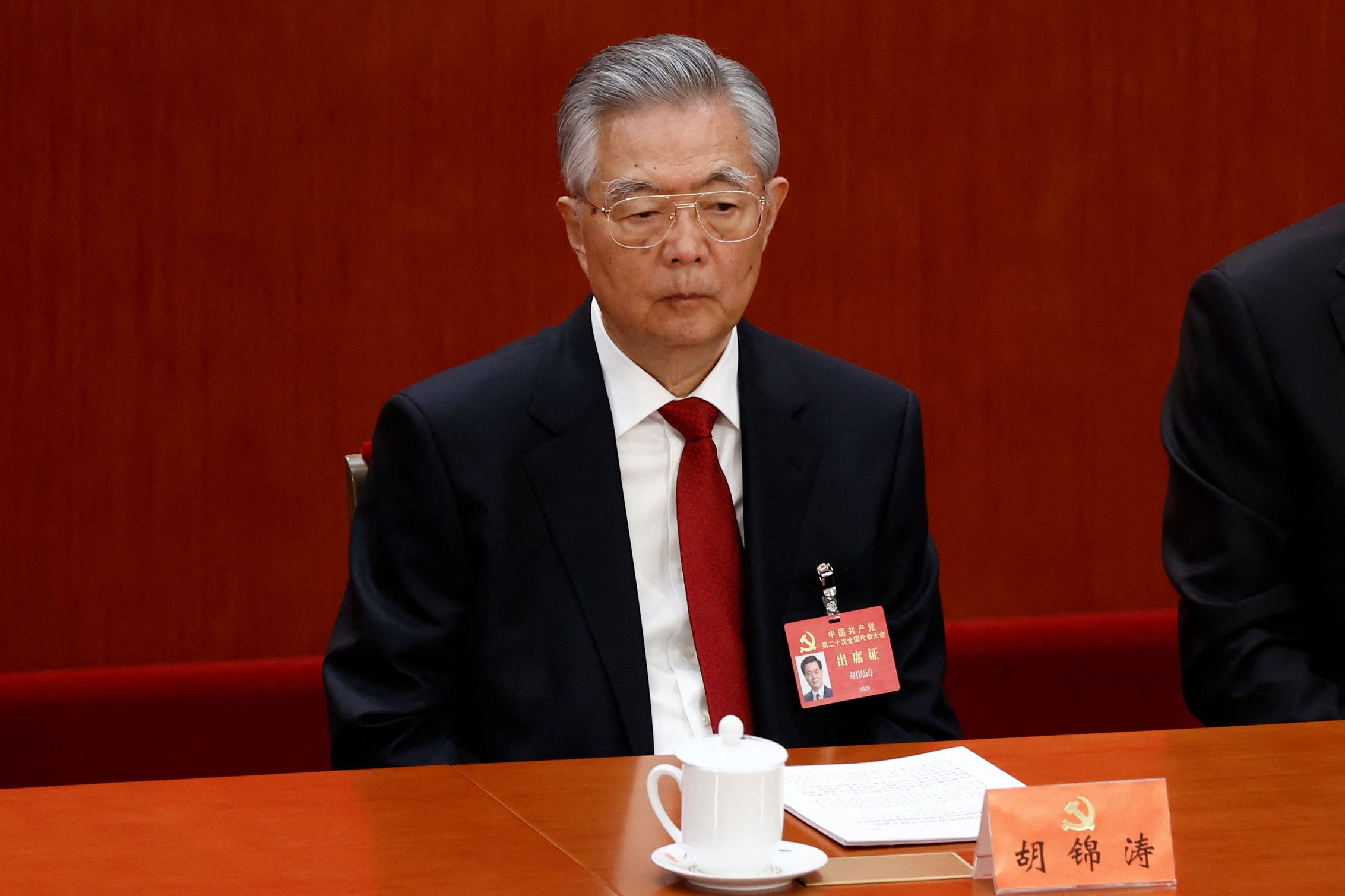Who is Hu Jintao? Xi Jinping’s predecessor removed from China’s party congress
Video shows former president, 79, reluctantly leaving closing ceremony of China’s National Congress
The heavily stage-managed National Congress of the Chinese Communist Party concluded on Saturday with a dramatic and as-yet unexplained moment: the apparent ejection of former president Hu Jintao from the main stage.
The 79-year-old was sitting next to his successor Xi Jinping for the closing ceremony of the party gathering when aides approached and, after some initial reluctance on Mr Hu’s part, escorted him away. As he left, the former president exchanged a word with Mr Xi and patted the shoulder of his former protegé, Chinese premier Li Keqiang.
It is not known at this stage whether Mr Hu’s departure from the meeting was planned, or whether the retired statesman had to be helped off the stage because he is unwell. China observers are divided over which explanation is the most plausible – there’s been no further clarification from officials on the incident so far.
Who is Hu Jintao?
Mr Hu served two five-year terms as China’s president from 2003 to 2013 – the full limit a politician could serve as the country’s leader until Xi Jinping’s recent move to amend the Chinese Communist Party’s constitution to grant himself a third.
The start of his presidency wasn’t smooth, with his predecessor Jiang Zemin retaining a great deal of influence and the key office of chairman of the military commission. Jiang only resigned from this role in 2004, allowing Mr Hu to cement his position of power.

Mr Hu’s two terms were characterised by an emphasis on the peaceful development of China, and he oversaw a period of strong economic growth as well as the successful staging of the 2008 Beijing Olympics.
Part of his philosophy was to place a greater emphasis on openness with the international community in order to foster trade relationships: his perceived “soft” stance on Taiwan improved relations with the island’s government and greatly increased economic cooperation between the two.
He was also seen as a relatively liberal leader within the party, allowing internal discussion on policy issues during the two National Congress gatherings that he oversaw.
Handover to Xi Jinping
Mr Hu’s leadership style contrasts sharply with that of his successor Xi Jinping, who even at the time of their handover was seen as a “strongman” to transform the country’s hitherto “weak” presidency. Since coming to power, Mr Xi has overseen a crackdown on civil freedoms and business practices and a much more bullish approach to international relations and the foreign media.
The transition was nonetheless smooth, with Mr Xi assuming all the key offices of power at once and Mr Hu retiring from politics – at the National Congress meeting to approve the handover, only one of nearly 3,000 party deputies voted in the Great Hall of the People in Beijing to oppose the succession.
Although Mr Hu’s departure was a clean break, his protegé and fellow liberal economist Li Keqiang was named as premier by Mr Xi, a recognition of the need for continuity in the pursuit of economic growth.
Why was Hu escorted out on Saturday?
It is highly unusual for an apparent disagreement among the highest-ranking political leaders in China to be aired to the public, meaning there are two possible explanations for what happened at the start of the closing ceremony in Beijing on Saturday.
The first is that Mr Hu’s departure is a staged and symbolic rejection of the older, more liberal order of the Chinese Communist Party – a changing of the guard that includes the removal of Mr Li from the all-powerful Politburo, alongside three other high-ranking officials.
This would fit with the fact that the incident took place just after TV cameras had been set up to show the proceedings in the Great Hall of the People – there had been a closed-door meeting beforehand. And it comes at a 20th National Congress that has been entirely geared to solidifying Mr Xi’s status as the country’s most powerful leader since Mao Zedong.
On the other hand, observers noted that Mr Hu had also appeared slightly unsteady last Sunday when he was assisted onto the same stage for the opening ceremony of the congress, on 16 October.
Before aides appeared to lead Mr Hu out of the hall, the former president was drawing concerned looks from both Mr Xi to his right and, to his left, senior party figures Li Zhanshu and Wang Huning.
If he had some kind of medical emergency, Mr Hu appeared reluctant to accept the need to go: in the video, he stays seated as an aide attempts to lift him by the armpits, then appears to try and move back to his seat once standing. Finally, he reaches for a folder on the table in front of the current president, before Mr Xi rests a hand on it and says a word or two.
Officials may be preparing an explanation of what happened, but it certainly wasn’t provided immediately on Saturday. State media coverage of the ceremony did not include the scene, which occurred just as journalists were entering the hall, and a CNN report of the incident was censored within China.
Join our commenting forum
Join thought-provoking conversations, follow other Independent readers and see their replies
Comments
Bookmark popover
Removed from bookmarks